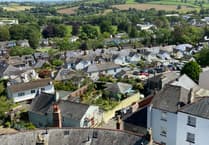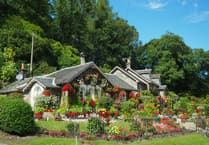The front of Dartmouth’s Naval college will shine brightly in tribute to the bravery of all those who served during World War 2, when the town commemorates the 75th anniversary of VE Day on Friday May 8.
Residents in Dartmouth and Kingswear are urged to get their torches out and shine them into the night sky from their gardens or balconies as part of the Navy’s Shine A Light campaign.
The campaign was launched to celebrate VE day in 1945, when the guns fell silent at the end of the war in Europe.
Years of carnage and destruction had come to an end and millions of people took to the streets and pubs to celebrate peace, mourn their loved ones and to hope for the future.
Townsfolk are urged to stick to the social distancing rules currently in place due to the coronavirus crisis, but are being urged to decorate their homes in the red, white and blue of the Union Flag and join in with the national sing-a-long.
Cadets at Britannia Royal Naval College plan march around the parade ground just before the two-minutes silence at 11am, and will join in with the BBC’s sing-a-long of We’ll Meet Again at 9pm, broadcast, it is hoped, through the parade ground’s PA system.
BRNC will complete the celebrations by lighting up the college and holding a Sunset Ceremony.
Captain Roger Readwin, the commodore of BRNC, said: “The 75th anniversary of the end of the war in Europe provides a timely opportunity to reflect on the sacrifices generations past and present have made to safeguard the lives and wellbeing of others.
“The role of the naval college, whether at Dartmouth or Eaton Hall during World War 2 remained as it does today, to develop courageous leaders with the spirit to fight and win, whatever challenges we face.”
Dartmouth district councillor, Jonathan Hawkins, said it was “fantastic” the college was joining in with the sing-a-long, adding: “The weather is forcecast good for Friday so we we encourage the communities on both sides of the River Dart to join in too and have some fun.”
BRNC played a key role in WWII, training naval officers alongside those from Commonwealth and Allied countries to take their place in the fight for democracy.
In September 1942, the college became a casualty of war when it was hit by a German bomb, causing significant damage to the main building but remarkably just one fatality, Petty Officer Wren Ellen Whittall.
Casualties could have been much higher, but it seemed the Germans miscalculated when the cadets would return from their summer leave.
As a result of the bomb, staff and students were evacuated to the Duke of Westminster’s house, Eaton Hall in Cheshire, where on 1 February 1943 the site was formally commissioned as HMS Britannia (Royal Naval College, Eaton).
Dartmouth’s war-scarred college was later taken over by combined operations and used to train Royal Marines in amphibious warfare.
On 27 December 1943, the college welcomed the US Navy, becoming their Advanced Amphibious Base ahead of the D-Day landings.
BRNC was one of a number of bases occupied by the US Forces throughout Devon and Cornwall. Known as U Force, the Americans were destined to land on Utah Beach on the Cherbourg peninsula, which closely resembled the South Devon coast.
By the beginning of 1944, more than 4,000 US Navy personnel were based in the Dartmouth area.
The US troops and their equipment set sail from Dartmouth on 4 June, taking shelter in Weymouth Bay on 5th until the storm abated, reaching Normandy the next day.
In spite of the Covid-19 crisis, BRNC continues to deliver essential training to cadets so they are ready to respond to the evolving COVID-19 situation while also maintaining key defence outputs.
Training continues in line with Public Health England guidance and is kept under review.




